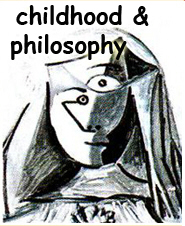a letter to an apprentice philosopher
Keywords:
Filósofo, preguntas, infancia, juegos de lenguaje, personasAbstract
Philosophers have a way of talking like childlike spirits who call into question what others regard as self-evident, thus taking themselves and us to unexpected locations. Can you be a learner of something which in fact is everything—or at least almost everything? Are philosophers also learners of languages? But do they not unlearn them because they already know them? There is something about these questions that drives us to address them through language games that leave us in our all-too-familiar epistemological territories. To what extent do we choose our language games, our worlds, and our forms of living together? Perhaps what apprentice philosophers do is to continue an open dialogue between incompetents, clumsy inquirers, or people trying to solve the question of how best to act in our actual environments. This letter, written to an apprentice philosopher, is about bringing what we call into question into reality, and as such is an act of creation through language. When we act in this way, we also find ourselves questioning the worlds of education, aligning them more closely with the epistemological territories we inhabit. By questioning the ways we communicate and educate, we are questioning the philosophical attitude itself, which is the attitude of asking what we did not ask before, or at least not in the way we had asked before. This challenge leads us to wander into other forms of thinking, inhabiting, communicating, experiencing life as art, as passion, and as a way of encountering the life we are made to live. On this trip with the apprentice philosopher--on this letter-writing path--we journey through three landscapes. In one of these we find--as suggested by Protagoras—that we may not need to define something in order to understand it, which would be the ruin of Plato’s epistemological strategy. In the second landscape, we find that there may in fact be no experts who know how we should live. Perhaps this is the most important realization for democracy as a way of life, since it fosters the shared desire for mutual recognition in interpersonal relationships, and nurtures the feeling of belonging to humanity and of being responsive to the world's needs. In the third, we find that the implicit aim of the apprentice philosopher is in fact an ideal of human usefulness.Downloads
Published
2014-02-10
How to Cite
amelivia, rodolfo rezola. (2014). a letter to an apprentice philosopher. Childhood & Philosophy, 9(18), 401–421. Retrieved from https://www.e-publicacoes.uerj.br/childhood/article/view/20664
Issue
Section
literature




